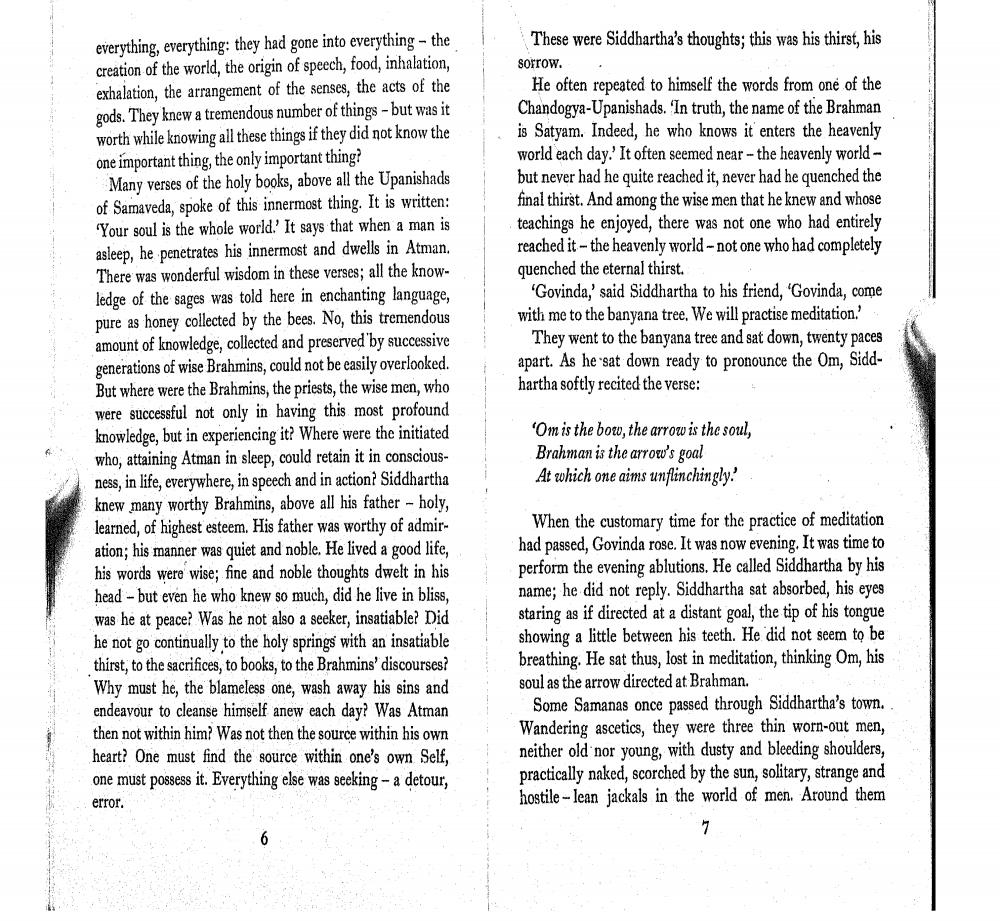Book Title: Siddhartha Author(s): Hermann Hesse, Hilda Rosner Publisher: Macmillan India View full book textPage 8
________________ These were Siddhartha's thoughts; this was his thirst, his sorrow. . He often repeated to himself the words from one of the Chandogya-Upanishads. 'In truth, the name of the Brahman is Satyam. Indeed, he who knows it enters the heavenly world each day.' It often seemed near the heavenly worldbut never had he quite reached it, never had he quenched the final thirst. And among the wise men that he knew and whose teachings he enjoyed, there was not one who had entirely reached it-the heavenly world - not one who had completely quenched the eternal thirst. 'Govinda,' said Siddhartha to his friend, "Govinda, come with me to the banyana tree. We will practise meditation.' They went to the banyana tree and sat down, twenty paces apart. As he sat down ready to pronounce the Om, Siddhartha softly recited the verse: everything, everything: they had gone into everything - the creation of the world, the origin of speech, food, inhalation, exhalation, the arrangement of the senses, the acts of the gods. They knew a tremendous number of things - but was it worth while knowing all these things if they did not know the one important thing, the only important thing? Many verses of the holy books, above all the Upanishads of Samaveda, spoke of this innermost thing. It is written: 'Your soul is the whole world.' It says that when a man is asleep, he penetrates his innermost and dwells in Atman. There was wonderful wisdom in these verses; all the knowledge of the sages was told here in enchanting language, pure as honey collected by the bees. No, this tremendous amount of knowledge, collected and preserved by successive generations of wise Brahmins, could not be easily overlooked. But where were the Brahmins, the priests, the wise men, who were successful not only in having this most profound knowledge, but in experiencing it? Where were the initiated who, attaining Atman in sleep, could retain it in consciousness, in life, everywhere, in speech and in action Siddhartha knew many worthy Brahmins, above all his father - holy, learned, of highest esteem. His father was worthy of admiration; his manner was quiet and noble. He lived a good life, his words were wise; fine and noble thoughts dwelt in his head - but even he who knew so much, did he live in bliss, was he at peace? Was he not also a seeker, insatiable? Did he not go continually to the holy springs with an insatiable thirst, to the sacrifices, to books, to the Brahmins' discourses? Why must he, the blameless one, wash away his sins and endeavour to cleanse himself anew each day? Was Atman then not within him? Was not then the source within his own heart? One must find the source within one's own Self, one must possess it. Everything else was seeking - a detour, error. 'Om is the bow, the arrow is the soul, Brahman is the arrow's goal At which one aims unflinchingly. When the customary time for the practice of meditation had passed, Govinda rose. It was now evening. It was time to perform the evening ablutions. He called Siddhartha by his name; he did not reply. Siddhartha sat absorbed, his eyes staring as if directed at a distant goal, the tip of his tongue showing a little between his teeth. He did not seem to be breathing. He sat thus, lost in meditation, thinking Om, his soul as the arrow directed at Brahman. Some Samanas once passed through Siddhartha's town. Wandering ascetics, they were three thin worn-out men, neither old nor young, with dusty and bleeding shoulders, practically naked, scorched by the sun, solitary, strange and hostile - lean jackals in the world of men. Around themPage Navigation
1 ... 6 7 8 9 10 11 12 13 14 15 16 17 18 19 20 21 22 23 24 25 26 27 28 29 30 31 32 33 34 35 36 37 38 39 40 41 42 43 44 45 46 47 48 49 50 51 52 53 54 55 56 57 58 59 60 61 62 63 64
